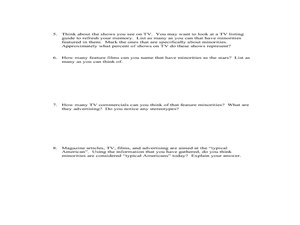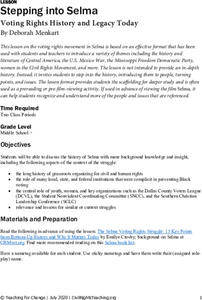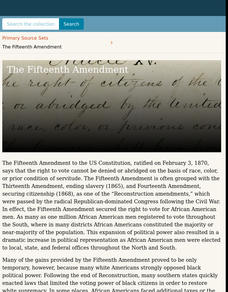Curated OER
Voices: Voting Rights
Young scholars examine the history of the right to vote in the United States. In this civics lesson, students research steps taken during the Civil Rights Movement to secure the rights of African Americans to vote.
Curated OER
Minorities in Mainstream American Society
So many people fought for Civil Rights in the United States. Read about the Civil Rights Act of 1964, and discuss what the act guarantees. Then pass out a slew of magazines and encourage them to observe how often minorities appear in...
Curated OER
The American Civil War: A Nation Divided (1861-1865)
Intended for use with atlases, this presentation details the causes and effects of the Civil War. It includes historical pictures of battles and discussion points about the technology which emerged during (and for) the war. The final...
Curated OER
Freedom Voices: Abolition and Suffrage in the United States
Students explore abolition and suffrage in the United States.
National Constitution Center
Voting Rights since the Fifteenth Amendment
What does it mean to have the right to vote? To what extent have interpretations of the Fifteenth Amendment changed over time? Young historians examine and analyze primary source documents, an interactive website, and historical analysis...
Library of Virginia
Antebellum Freedom
From indentured servitude to involuntary race-based servitude, slavery has taken many forms in American history. Class members examine three manumission petitions that reveal how the rights of African Americans and African American...
Curated OER
Segregation - The Jim Crow Law
In this segregation worksheet, students read about the Jim Crow Laws and the effects they had on African Americans. Students learn about inequality during this time period.
US National Archives
Documented Rights Educational Lesson Plan
How have groups struggled to have their unalienable rights recognized in the United States? Acting as a research team for the Human Rights Council of the United Nations, your young historians will break into groups to research...
National Woman's History Museum
Stacey Abrams: Changing the Trajectory of Protecting People’s Voices and Votes
For this project-based learning lesson, young social scientists investigate Stacey Abrams' campaign to protect the voting rights of people across the nation. Investigators learn how to annotate assigned articles, watch videos, and...
DocsTeach
Fannie Lou Hamer and Voting Rights
To understand the challenges Black voters faced in Mississippi, middle schoolers first gather background information about Fannie Lou Hamer and then read her testimony given during the 1964 Democratic Nation Convention. After a...
Digital Public Library of America
Ida B. Wells and Anti-Lynching Activism
A packet of 13 primary sources provides young historians with insight into the anti-lynching activism of civil rights Ida B. Wells. Included are images of Wells, her letters, a political cartoon, newspaper lynching announcements, and a...
National Woman's History Museum
Ida B. Wells: Suffragist and Anti-Lynching Activist
Suffragette, investigative journalist, and civil rights activist Ida B. Wells is the focus of a lesson that has young historians study the work of this amazing woman. Scholars watch a video biography of Wells, read the text of her speech...
Academy of American Poets
Teach This Poem: "When Fannie Lou Hamer Said" by Mahogany L. Browne
After watching an excerpt from a video of Fannie Lou Hamer's testimony before Congress, pupils do a close reading of Mahogany L. Browne's poem "When Fannie Lou Hamer Said," annotate words and phrases that draw their attention and list...
Teaching for Change
Stepping into Selma
The 1964 Selma to Montgomery, Alabama voting rights marches are the focus of a instructional activity designed to introduce learners to people who took part in the Civil Rights Movement. Class members set into the role of one of the...
Facing History and Ourselves
A Contested History
Memories of and interpretations of history change—that's the key takeaway from a lesson that has young historians compare the story of the Reconstruction Era as told by the historians of the Dunning School to the view of scholars today...
Digital Public Library of America
The Fifteenth Amendment
Fifteen primary sources provide a context for a study of the Fifteenth Amendment to the United States Constitution. The packet captures the excitement for the changes promised by the amendment as well as the backlash against it.
PBS
Voting Rights History
Why is voting so important, anyway? Learn more about the importance of exercising a right for which many men and women marched, fought, and legislated with an interactive timeline activity.
Curated OER
Breaking Barriers
Students investigate racism in the 20th century by exploring U.S. History. For this Civil Rights lesson, students review the history of slavery, the Civil War and the fight for equality in the mid 1900's. Students complete Civil Rights...
Curated OER
Uncle Tom's Cabin as Anti-Slavery Argument
Pupils read and discuss how African- Americans are depicted in slave auction announcements. They research how Harriet Beecher Stow responds to the sale of slaves.
Curated OER
Laws of Civil Rights
Students investigate the Civil Rights Act of 1964. In this segregation instructional activity, students explore the rights that were guaranteed by the legislation as well as attempts by southerners to stop African Americans from voting....
Curated OER
The Life of Frederick Douglass
Students discuss the importance of effective leadership in a democratic society. They study the significance of the contributions of Frederick Douglass to America. They compare the effects of political, economic, and social factors on...
National Endowment for the Humanities
Women's Lives Before the Civil War
Women's lifestyles before the Civil War made a huge impact as a point of causation. Give middle schoolers the opportunity to view firsthand the lives of women before the Civil War. They analyze primary source documents, view photographs,...
Curated OER
Say It Loud!: A Celebration Of Black Music in America - Louis Armstrong
High schoolers listen to selections of New Orleans street band music. They explore the culture of New Orleans in the 1920's, and perform a closer examination of Armstrong's music.
Curated OER
Fight For Your Right - Leading A Revolution of Change
Learners examine civil rights. In this civil rights lesson, students research human rights issues of United States history. Learners then discuss their research findings and write Bill of Rights statements for the topics they researched.

























